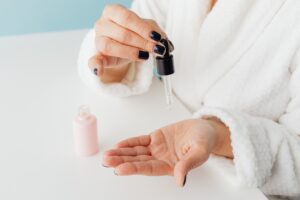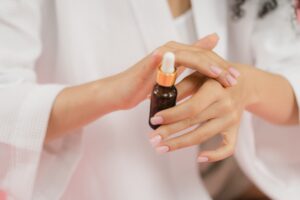Aromatherapy for Skincare

When it comes to skincare, there are countless options out there promising to help us achieve healthy and glowing skin. One approach that has been gaining popularity in recent years is the use of aromatherapy and essential oils. Essential oils are highly concentrated plant extracts that can offer a range of benefits for the skin, from moisturizing to reducing inflammation. Here, we’ll take a closer look at how essential oils can benefit your skin and how to use them effectively.
Firstly, it’s important to note that not all essential oils are created equal. While many are beneficial for the skin, others can be irritating or even harmful if not used correctly. It’s important to choose high-quality oils from a reputable source and to dilute them properly before use. Carrier oils such as jojoba, sweet almond, and coconut oil can be used to dilute essential oils and make them safe for topical use.
The Benefits of Essential Oils for the Skin
- Moisturizing: Many essential oils have emollient properties, meaning they can help to soften and soothe the skin. Some of the best oils for moisturizing include lavender, chamomile, and rose. These oils can be added to your favorite moisturizer or mixed with a carrier oil and applied directly to the skin.
- Anti-inflammatory: Inflammation is a common cause of skin issues such as acne, rosacea, and eczema. Fortunately, there are several essential oils that have anti-inflammatory properties and can help to calm irritated skin. Tea tree oil, chamomile, and lavender are all great options for reducing inflammation and redness.
- Anti-aging: Essential oils are rich in antioxidants, which can help to protect the skin from free radical damage and prevent premature aging. Some of the best oils for anti-aging include frankincense, rose, and geranium. These oils can be added to your favorite serum or mixed with a carrier oil and applied as a nighttime treatment.
- Acne-fighting: Acne is a common skin issue that can be difficult to treat. However, essential oils such as tea tree oil, lavender, and clary sage have been shown to have antibacterial properties and can help to combat acne-causing bacteria. These oils can be added to a facial cleanser or toner for an extra boost of acne-fighting power.
- Brightening: Essential oils can help to brighten the skin and even out skin tone. Citrus oils such as lemon, grapefruit, and orange are particularly effective for brightening and can be added to a facial mist or mixed with a carrier oil for use as a serum.
How to Use Essential Oils
Now that we’ve covered some of the benefits of essential oils for the skin, let’s talk about how to use them effectively. Here are some tips:
- Always dilute essential oils before use. As mentioned earlier, essential oils are highly concentrated and can be irritating or even harmful if used undiluted. Dilute essential oils in a carrier oil such as jojoba, sweet almond, or coconut oil before applying to the skin.
- Do a patch test before use. Even when diluted, some essential oils can still cause irritation or allergic reactions in some people. It’s always a good idea to do a patch test on a small area of skin before applying the oil to your face.
- Use essential oils sparingly. A little goes a long way when it comes to essential oils. Start with just a drop or two and adjust as needed.
- Avoid using essential oils around the eyes. Essential oils can be irritating to the eyes, so it’s best to avoid applying them in the eye area.
- Use caution when using certain oils. Some essential oils, such as citrus oils, can increase photosensitivity and make the skin more prone to sunburn. If using these oils, be sure to avoid sun exposure or wear sunscreen to protect your skin.
- Consider consulting with a professional aromatherapist. Aromatherapy is a complex field, and there are many factors to consider when using essential oils for skincare. If you’re unsure about which oils to use or how to use them safely, consider consulting with a professional aromatherapist who can help guide you.

Extra Tips
In addition to using essential oils topically, aromatherapy can also be incorporated into your skincare routine in other ways. Here are a few ideas:
- Facial steaming: Adding a few drops of essential oil to a bowl of steaming water can create a relaxing and rejuvenating facial steam. Lavender, rose, and eucalyptus are all great options for facial steaming.
- Bathing: Adding a few drops of essential oil to a warm bath can create a soothing and aromatic soak. Chamomile, lavender, and ylang-ylang are all great options for a relaxing bath.
- Diffusing: Using an essential oil diffuser in your home can create a calming and uplifting atmosphere. Lemon, peppermint, and frankincense are all great options for diffusing.
- Massage: Essential oils can be added to a carrier oil and used for a relaxing and rejuvenating massage. Rose, geranium, and sandalwood are all great options for a calming massage.
In conclusion, aromatherapy and essential oils can offer a range of benefits for the skin, from moisturizing to reducing inflammation and brightening the complexion. However, it’s important to choose high-quality oils from a reputable source, dilute them properly, and use them sparingly and with caution. By incorporating essential oils into your skincare routine in a safe and effective way, you can achieve healthy and glowing skin naturally.

